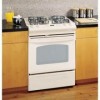GE JGSP28DENCC Use and Care Manual - Page 13
Preheating and Pan Placement, Oven Moisture, Oven Vent, Aluminum Foil
 |
UPC - 084691180258
View all GE JGSP28DENCC manuals
Add to My Manuals
Save this manual to your list of manuals |
Page 13 highlights
Do not place foods or pizza stone directly on the oven floor. Preheating and Pan Placement Preheat the oven if the recipe calls for it. Preheating is necessary for good results when baking cakes, cookies, pastry and breads. To preheat, set the oven at the correct temperature. The control will beep when the oven is preheated and the display will show your set temperature. The preheat time will vary depending on the temperature setting. Aluminum Foil Do not use aluminum foil to line oven bottoms. The foil will trap heat below and upset the performance of the oven. Foil can melt and permanently damage the oven bottom. Damage from improper use of aluminum foil is not covered by the product warranty GEAppliances.com Baking results will be better if baking pans are centered in the oven as much as possible. If baking with more than one pan, place the pans so each has at least 1" to 11⁄2" of air space around it. Foil may be used to catch spills by placing a sheet on a lower rack, several inches below the food .Do not use more foil than necessary and never entirely cover an oven rack with aluminum foil. Keep foil at least 1-1/2" from oven walls to prevent poor heat circulation Oven Moisture As your oven heats up, the temperature change of the air in the oven may cause water droplets to form on the door glass. These droplets are harmless and will evaporate as the oven continues to heat up. Oven Vent Your oven is vented through the rear vent located through the cooktop under the vent grille. Do not block this vent when cooking in the oven-it is important that the flow of hot air from the oven and fresh air to the oven burner be uninterrupted. Avoid touching the vent openings or nearby surfaces during oven or broiler operation-they may become hot. n Handles of pots and pans on the cooktop may become hot if left too close to the vent. n Do not leave plastic items on the cooktop-they may melt if left too close to the vent. n Do not leave any items on the cooktop. The hot air from the vent may ignite flammable items and will increase pressure in closed containers, which may cause them to burst. n Metal items will become very hot if they are left on the cooktop, and could cause burns. 13















